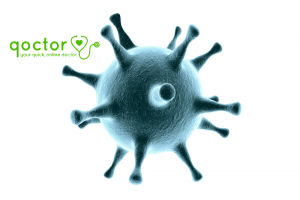Cold Sores
Welcome to Qoctor’s online doctor service which can provide assessment for Cold Sores. Answer some online questions, then book a consultation with an AHPRA-registered doctor. Repeats available (subject to assessment). Please also note, your pharmacist may be able to assist you with over the counter treatments for cold sore.
The consultation fee is $29.99. If a prescription is advised, it can be sent as an eScript to your phone OR electronically to your local pharmacy. Alternatively you can have medication delivered by an Australian partner pharmacy- in this case, the cost of medication is added at the checkout. All treatment and advice is issued subject to your doctor’s assessment.
About Cold Sores
Cold sores are caused by the Herpes Simplex Virus (HSV1), which is spread by skin to skin contact. About 1 in 5 people have cold sores that flare up from time to time. They usually get better without treatment in 7-10 days, though sometimes antiviral creams or tablets may be used to ease symptoms.

FAQs about HSV1 & cold sores
- Cold sores are caused by the Herpes Simplex Virus Type 1, otherwise known as HSV1.
- HSV2 is a similar virus which usually causes genital herpes, but rarely can also cause cold sores around the mouth.
- Cold sores are spread by skin to skin contact, such as kissing someone who has an active cold sore.
- The first infection may not cause any symptoms, but may be triggered later.
- Cold sores can be triggered by stress, fatigue, viral illness, strong UV/sunlight exposure or during menstruation.
- Cold sores are spread by skin to skin contact
- If you have active cold sores you should avoid newborn babies, elderly, or anyone with a weak immune system (e.g on chemotherapy)
- If you have no active cold sores, you’re not usually infectious to others.
- No, usually you do not need any tests to diagnose cold sores.
- The diagnose tends to be obvious, based on history and the appearance of the lesions
- However, if there’s any doubt, your GP can perform a swab and send it to the laboratory for analysis for HSV1.
• People with recurring cold sores occasionally worry that there’s something wrong with their immune system, or that they’re deficient in a vitamin or mineral. But cold sores are very common, and most people who get them are otherwise perfectly well.
• Sometimes tiredness or another viral illness can make you more prone to cold sore flare ups
• If you’re worried, speak to your doctor- they may recommend some general blood tests to check for an underlying cause.
• Usually no particular medication for cold sores is recommended- they naturally get better over 7-10 days.
• There is some general advice when you have active cold sores, such as avoid touching the cold sores; wash hands regularly especially after applying creams or before putting in your contact lenses; and don’t share lip balm or sunscreen.
• Over the counter painkillers like Panadol and Nurofen, or topical anaesthetic gels (e.g Lidocaine) may be helpful for pain/discomfort.
• Antiviral Creams can be bought at your pharmacy- these do not kill the virus but prevent it from multiplying which may reduce symptoms a little.
• Oral antiviral medication may be prescribed to reduce the severity of symptoms, in some suitable cases. This approach may be appropriate if you have severe or frequent cold sores, or a weakened immune system for some reason- speak to your doctor for further advice.
Once you’ve been infected, HSV1 stays in your body. In some people it means cold sores flare up from time to time, in others HSV1 lies dormant, and flares up rarely or not at all.
Health Library- Cold Sores (HSV1)
What is Rubella and why is it dangerous?
What is Rubella and why is it dangerous? What is Rubella? Rubella (sometimes called German Measles) is a viral infection. It used to be very common, but routine vaccination has reduced cases dramatically in Australia. In 2018 the World Health Organisation announced that Australia had eliminated Rubella. However, it is still possible for outbreaks to happen, as people travel here from other regions where Rubella is still common. Request a medical certificate Why is Rubella dangerous? Rubella infection is relatively mild for most people. However, if a woman gets Rubella during pregnancy, if can cause miscarriage or serious birth defects in the developing foetus. What happens if you get Rubella in pregnancy? If a pregnant woman catches Rubella in the first 8-10 weeks of pregnancy, there is a 90% chance of miscarriage or serious birth defects in the [...]
Why is Measles so serious?
Why is Measles such a dangerous infection? What is Measles? Measles used to be a common illness. The MMR vaccine has dramatically reduced the number of cases in Australia, but in recent times there have been outbreaks due to lower uptake of vaccinations in some areas, as well as people returning from countries where Measles is still common. So why is there such concern when Measles outbreaks occur? Unfortunately, Measles can lead to extremely serious complications, some of which can be life-threatening. Measles is a highly contagious viral illness. It is estimated an infected person will infect about 90% of non-immune people they have contact with. People who have had the MMR vaccination or previous Measles infection will usually be protected from infection. Request a medical certificate How is Measles spread? Measles is spread by inhaling or [...]
Flu symptoms- how do you know if you have Influenza?
What are the symptoms of Influenza (Flu)? What is Influenza? Many people say they have “the flu” when they experience viral symptoms, however true Influenza is generally a lot worse than a common cold, and in some cases can even be life-threatening. Influenza or “flu” is a virus that causes infection of the respiratory tract (nose, airways and lungs). It is spread by breathing in the airborne droplets released when an infected person coughs or sneezes. You can also catch Influenza by touching an object or surface contaminated by an infected person, and then touching your own mouth or nose. A person is usually contagious for a day or so before symptoms of Influenza appear, and for about 5 days afterwards, though people with weakened immune systems may be contagious for slightly longer. Following exposure, it can take 2 or 3 days for flu [...]



